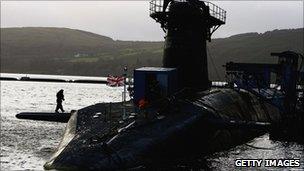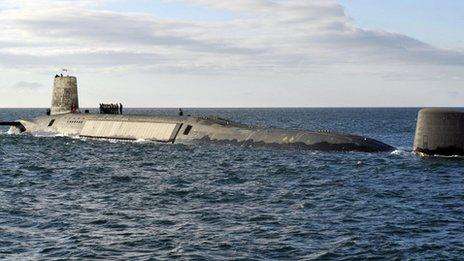Trident contracts worth £350m unveiled by MoD
- Published

The final cost of the replacement submarines is expected to be at least £20bn
The Ministry of Defence has awarded £350m contracts for the next generation of nuclear-armed submarines to BAE Systems, Babcock and Rolls-Royce.
The contracts are part of £3bn already set aside to start work on the replacement of the UK's fleet of four Trident nuclear submarines by 2028.
Defence Secretary Philip Hammond said this was "an important step" towards renewing the UK's nuclear deterrent.
The Conservatives are pressing ahead despite objections from the Lib Dems.
The Tories' coalition colleagues have long argued for a cheaper alternative to replacing the Royal Navy's ageing submarines that carry Britain's nuclear deterrent and which are due to reach the end of their lives in the next decade.
As part of the coalition agreement, the Conservatives said they would look at alternatives and delayed a final decision on replacing Trident until 2016, after the next general election.
But in reality the MoD is already pressing ahead with work on the next generation of nuclear armed submarines, says BBC defence correspondent Jonathan Beale.
The Lib Dems are expected to publish a review looking at other options.
Deterrent 'into 2060s'
The first Successor submarine is due to be delivered in 2028, replacing the Vanguard Class submarines which currently carry Trident, the UK's nuclear deterrent.
The largest contract, worth £328m, has been awarded to BAE Systems Maritime - Submarines, which will work on the overall submarine design.
Babcock has been awarded £15m and will focus on designing parts of the in-service support.
More than £4m has been awarded to Rolls-Royce which will be responsible for the integration of the reactor design.
The MoD said that although a decision on the final design and build would not be made until 2016, detailed work had to take place now to ensure that the Successor submarines would be the most technologically advanced.
Mr Hammond told MPs the contracts announced were a step towards ensuring the UK had a nuclear deterrent "into the 2060s".
Eric Grove, director of the University of Salford's Centre for International Security and War studies said: "It's without commitment in theory but of course it is with commitment in practice. We wouldn't be spending this kind of money on design if it didn't look as if it was going to go forward."
'Cutting edge equipment'
He added: "We have a world-class submarine-building industry in this country and this programme will help to sustain or create more than 1,900 jobs across the UK.
"By making the core equipment programme fully funded and affordable, we are able to confirm additional equipment projects which help safeguard our national security."
He has also included the final cost of the replacement submarines - expected to be at least £20bn - in his latest budget plans.
The first of the four Trident submarines had been due to leave service in 2022 but the government extended the vessels' lives as part of the 2010 defence and security review.
BAE Systems managing director John Hudson said the new contract would "help sustain the jobs of over 1,000 skilled employees currently working on the programme [and] also provides the opportunity to grow our workforce by a further 280 in 2012".
These jobs are based at its site in Barrow-in-Furness, Cumbria.
First Sea Lord, Admiral Sir Mark Stanhope, said: "The Royal Navy has been operating continuous at sea deterrent patrols for more than 40 years and the Successor submarines will allow us to do so well into the future with cutting edge equipment."
The Campaign for Nuclear Disarmament described Britain's nuclear weapons as a "bottomless pit" for spending.
General secretary Kate Hudson said: "A majority of the public want to scrap Trident now. The last thing they want to do is replace it. And yet they are being forced to fund its replacement while they see local services cut.
"The sad truth is that, as shocking as today's announcement is, £350m is just a drop in the ocean compared with the total cost of replacing Trident, which will amount to well over £100bn over its lifecycle."
- Published23 May 2017

- Published5 March 2012